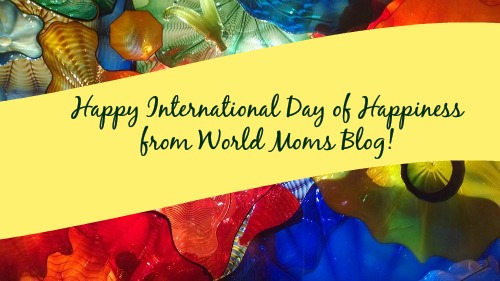
by World Moms Blog | Mar 20, 2015 | 2015, Awareness, Babies, Being Thankful, Caring, Communication, Eva Fannon, Family, Food, Girl Child, Girls, Gratefulness, Health, Humanity, International, Kids, Motherhood, Older Children, Parenting, Tinne, World Motherhood, Younger Children
 Today is International Day of Happiness! We at World Moms Blog know the importance of connecting with other people. In our technology driven societies, it becomes very easy to send a text message, an email, or to click “Like” on someone’s Facebook status…but does that actually make us feel like we made a personal connection with that person? Truly connecting is not as easy!
Today is International Day of Happiness! We at World Moms Blog know the importance of connecting with other people. In our technology driven societies, it becomes very easy to send a text message, an email, or to click “Like” on someone’s Facebook status…but does that actually make us feel like we made a personal connection with that person? Truly connecting is not as easy!
For International Day of Happiness this year, the theme is focusing on your connections with others. To help you think about conversation starters, or ways to connect with others on a more personal level, we asked our fabulous contributors this question: “What brings you happiness?” Read on to see some of their responses. (more…)
World Moms Blog is an award winning website which writes from over 30 countries on the topics of motherhood, culture, human rights and social good. Over 70 international contributors share their stories from around the globe, bonded by the common thread of motherhood and wanting a better world for their children.
World Moms Blog was listed by Forbes Woman as one of the "Best 100 Websites for Women 2012 & 2013" and also called a "must read" by the NY Times Motherlode in 2013. Our Senior Editor in India, Purnima Ramakrishnan, was awarded the BlogHer International Activist Award in 2013.
More Posts

by Karyn Wills | Mar 19, 2015 | 2015, Awareness, Communication, Divorce, Family, Grief, Health, Husband, Identity, Life, Life Lesson, Marriage, Maternal Health, Mental Health, Mental Illness, New Zealand, Priorities, Relationships, Responsibility, Stress, Womanhood, World Motherhood
 I didn’t have a bad marriage.
I didn’t have a bad marriage.
I wasn’t beaten or mistreated.
My ex never had an affair.
Money stressors were manageable.
We rarely argued.
To the outside world we seemed absolutely fine. But we weren’t.
It was, for me, an intensely sad marriage. And for a long time I couldn’t work out why. Here was a perfectly pleasant man who wished me well and who responded to my affection. He worked hard and was what most of us would call a “good guy”. He still is. But my self-esteem was dropping and my mood was becoming a habitual mix of frustration and melancholy.
It was one of those slow drifts downwards, like water eroding rock.
Then, around 10 years ago, he was diagnosed with something call Alexithymia. It’s not a mental disorder but more of a fixed personality trait. It’s common in those formally on the autism spectrum, in those with Post Traumatic Stress Disorders and in some of us with attachment issues from our early childhood.
Basically, anyone with Alexithymia cannot identify the bodily sensations that go along with their emotions. They still have the same sensations but are unable to distinguish between them and label them. They also have a very limited imaginative life, which sounds fine, until you realise predicting outcomes and taking steps to avoid the less desirable ones, are in fact, a product of our imagination.
These two issues give rise to a deep lack of empathy and ability to relate to another human being. Sympathy –the intellectual understanding of the experience of another–can happen but the actual feeling of an emotion, as another has it, in the sense of true empathy, cannot.
For me, this meant I would have to be sobbing in front of my ex before he understood I was sad, and then have to tell him to give me a hug, as the appropriate response. He did not mean to be uncaring. He just never understood subtle body language or had the instinctive responses that most of us have.
There are always three choices in a situation: To alter it; to put up with it; or to leave.
For many years I did my best to see if things could change. I offered to go back to work, so he could get therapy. I suggested counselling, on more than one occasion. None of these offers were ever taken up.
The more I read about Alexithymia, the more I realised… I would never be taken up on any of these. People with Alexithymia see the rest of us as over-emotional and confusing. They cannot see why they would leave their completely logical realms. Their idea of a perfect partner is a kind body in the house with whom there is as little emotional deviation and routines are maintained – this was exactly what our marriage was.
As time went by, I became increasingly distant and detached. At times, I became unpleasant and down right bitchy. Then, around three years ago, someone asked me what made me happy. And I couldn’t tell them. From being someone who was a perpetual optimist, I was by then emotionally dead – aside from experiencing frustration and melancholy. It was a massive wake up call and I knew something had to change.
It did take three years for me to be ready. There is a comfort in familiarity that is enticing. But in the end, my physical body was beginning to suffer, my older boys were finding the emotional disconnect from their father tough going and the other side of the leap to leave seemed less stressful than staying.
I am sure I was by no means the perfect partner either. But I share this here because these are immensely lonely and soul-destroying relationships to be in – and many who are in them either think they are going crazy or that they are the only ones ever to have this experience or some combination of both. But neither are true.
You’re not crazy. You’re not alone. The shell of the outside relationship that the world sees is not the whole story.
I understand.
Have you ever known someone with Alexithymia? Tell us your tale.
This is an original post to World Moms Blog from our long-time contributor and mother to three in New Zealand, Karyn Sparkles Willis.
The image used in this post is attributed to Nathan Jones. It carries a Flickr Creative Commons attribution license.
Karyn is a teacher, writer and solo mother to three sons. She lives in the sunny wine region of Hawke’s Bay, New Zealand in the city of Napier.
More Posts

by Dee Harlow (Laos) | Mar 18, 2015 | Africa, AIDS, Health, International, Maternal Health, Motherhood, World Moms Blog, World Motherhood
 Now that our family has settled in nicely to life in Maseru, the capital city of Lesotho, I can turn outwards to learn more about the country and its people.
Now that our family has settled in nicely to life in Maseru, the capital city of Lesotho, I can turn outwards to learn more about the country and its people.
The first thing that I had to learn to keep straight was how to call the people and their language:
- the country is Lesotho
- the people are Basotho
- the language is Sesotho
So, the Basotho live in Lesotho and speak Sesotho. Clear?
Of course, as a mother, I’ve been looking closely at the world of mothers here. I’m curious about our similarities, differences, and challenges.
The Sesotho designation to all adult married women is “‘M’e,” which means ‘mother’. I miss being called “Madame” as was the case in Laos, but I quickly grew accustomed to “‘M’e.” (Except when adult men would translate it into English and call me “Mommy” in their deep baritone voices, which at first sounded creepy.) I have had to remember that it is a sign of showing respect to call me “Mommy”, and doubly so because they are going through the trouble of translating it into my language.
Indeed, “the mother” appears to be a very well-respected position in the Basotho household and society. At least outwardly. The women walk tall and proud, and are commanding in speech. This elicits a certain degree of deference and respect–at least from me anyway! The women here are definitely not of the American custom of making you their BFF with reassuring agreements, nods, and smiles, and setting the next date for coffee and friending you on Facebook right away. It is more of a distant and courteous “I like you”, and reminds me of first meeting northern Europeans, the layers peeling away into jokes and smiles the more you meet and truly get to know one another.
Despite the outward display of respect for ‘M’e, however, are some staggering statistics for the health status of women in Lesotho. According to a gender-based violence (GBV) prevalence survey conducted in 2013, 86% of women have experienced GBV in their lifetime. This figured is viewed as a gross underestimation since the survey revealed that only 2-3% of respondents reported the violence, and only 1% of those raped by non-partners ever reported the rape to the police or health care workers.
Another astounding statistic is HIV prevalence among women in the country. Adult HIV prevalence is estimated at 23.6% (the second highest in the world), according to a 2009 United Nations study. Moreover, women are more likely to be HIV+ than men (27% vs. 18% respectively). And due to maternal transmission of HIV, approximately 15,000 HIV+ women deliver children each year, with 40% of these children becoming infected.
Some might say that the social and economic roots to both of these issues for women in Lesotho are due to the poor state of the Lesotho economy, where 57% of the population live below the poverty line and 25% are unemployed. This has led to worker migration seeking job opportunities in surrounding countries, areas also experiencing high HIV rates. Out of a total population of barely 2 million people, 25% are estimated to work in South Africa’s formal and informal sectors. This has implications for cross-border HIV transmission through risky sexual behavior by migrants, as well as by partners left at home in two of the highest HIV prevalent countries in the world.
Perhaps it is the very personal and private issues of violence and HIV that explain what I’ve observed here as very close female bonds. At social gatherings, the women and men tend to self-segregate. Not due to any religious beliefs (the Basotho are predominantly Christian), or traditional practices. Rather, it appears to me that a circle of women is where they find trust, openness and support for what they all experience and fear. From what I can see, it is a very close bond that is essential to every woman here. To be let in will take more than hosting coffee and being Facebook friends. In the meantime, I stand with them in the spirit of womanhood and motherhood, from afar for now.
Do women in your country/culture have exceptionally strong social bonds? What do you think it is attributed to?
This is an original post to World Moms Blog by our mother of twins writer, Dee Harlow, currently living in Lesotho. You can also find her on her blog Wanderlustress.
Photo credit, with permission, attributed to Malinak Photography, all rights reserved. This photo has a creative commons noncommercial share alike license.
Sources:
CIA World Factbook
Wilson, FHI, USAID, IMPACT, Lesotho and Swaziland: HIV/AIDS assessments at cross-border and migrant sites in Southern Africa, 2002
Joint United Nations Programme on HIV/AIDS, Together We Will End AIDS, 2012
The Ministry of Gender Youth Sports and Recreation, Lesotho Bureau of Statistics and Gender Links, Findings of the Lesotho Violence Against Women Baseline Study, 2014
UNICEF, Lesotho National Strategic Plan for Elimination, 2011
The World Bank Data
One of Dee’s earliest memories was flying on a trans-Pacific flight from her birthplace in Bangkok, Thailand, to the United States when she was six years old. Ever since then, it has always felt natural for her to criss-cross the globe. So after growing up in the northeast of the US, her life, her work and her curiosity have taken her to over 32 countries. And it was in the 30th country while serving in the Peace Corps in Uzbekistan that she met her husband. Together they embarked on a career in international humanitarian aid working in refugee camps in Darfur, Sudan, and the tsunami torn coast of Aceh, Indonesia.
Dee is now a full-time mother of three-year old twins and continues to criss-cross the globe every two years with her husband who is in the US Foreign Service. They currently live in Vientiane, Laos, and are loving it! You can read about their adventures at Wanderlustress.
More Posts

by Katinka | Mar 16, 2015 | Belgium, Communication, Health, Mental Health, Mental Illness, World Motherhood
 When it comes to introducing serious business to my 8 year old and my 6 year old, I have noticed that I often use metaphors. Not the euphemism kind, like ‘Grandma went to sleep for a very long time‘, but the raw truth in a friendly package.
When it comes to introducing serious business to my 8 year old and my 6 year old, I have noticed that I often use metaphors. Not the euphemism kind, like ‘Grandma went to sleep for a very long time‘, but the raw truth in a friendly package.
As it is, I’m healing from a depression I have long been ignoring. Today, I don’t intend to talk about depression though. Those stories sadly are plenty, including here and there on World Moms Blog. As always, I prefer to talk about my kids.
They both know something is wrong with their mommy. They know I have an illness that is mostly settled in my head, but that makes my body overly tired and trembling as well. They also know there are a lot of people helping me to cure from this illness called depression. I believe it is important to be honest. They will sense something is out of the hook anyway.
In fact, it wasn’t difficult to explain to them at all. They were even ecstatic about it, because it meant their mommy would be at home from work for a very long time. They experience my sick leave as an extended holiday with lots of mommy-time.
But I did owe them some further explanation. You see, at the deepest moments of my depression, I was easily irritated. Way too easily. That’s where the metaphor comes in. I talked to them about my Balloon. I believe you can use the Balloon when you’re not suffering from depression, but just irritated or angry because of stress at work, in your relationship, or just because of, well, life.
You see, we all have a Balloon somewhere inside us. Mine is inside my tummy. My Balloon is filled with old anger and sorrow that has been nagging at me for years. When I’m stressed about work, traffic or household issues, the new sorrows will pile up inside the Balloon. Most people have Balloons that grew larger while they were growing up, but mine didn’t. I still have a very small one. And it’s almost constantly full.
The kids, they know what happens with a regular balloon that is just too full. It will explode with a scary bang. They really dread that sound.
Now, sometimes, when they are acting up, those little annoyances can be the final blow that make my little Balloon pop. I want them to understand that such explosions are not their fault at all. Almost nothing of which was already filling the Balloon is their doing. It’s mostly old stuff, from the time before they were even born.
The sick leave, the medication and all the doctors are now helping me to empty my Balloon. If I really try hard, I will even get a bigger one. That way, it won’t pop as easily any more.
I didn’t know whether they really understood, until my 6 year old girl came to me after another Balloon collapse. I wanted to apologize, but she shushed me.
You don’t need to say sorry, mommy. We understand. Your Balloon was just too full.
I apologized anyway, while cleaning up the invisible remains of my Balloon.
They deserve that much.
Do you use metaphors to talk about difficult subjects with your kids? Which ones?
This is an original post to World Moms Blog by K10K @ The Penguin and The Panther.
“Black toy balloon” by AJ – Open clip Art Library image’s page. Licensed under CC0 via Wikimedia Commons
If you ask her about her daytime job, Katinka will tell you all about the challenge of studying the fate of radioactive substances in the deep subsurface. Her most demanding and rewarding job however is raising four kids together with five other parents, each with their own quirks, wishes and (dis)abilities. As parenting and especially co-parenting involves a lot of letting go, she finds herself singing the theme song to Frozen over and over again, even when the kids are not even there...
More Posts

by Tara Bergman (USA) | Mar 13, 2015 | 2015, Awareness, Communication, Life Lesson, Tara B., USA, World Motherhood, Writing

I currently have someone in my life with whom I can only contact via letters. I am talking about snail mail, meaning hand writing or typing a cohesive self-narrative, putting a stamp on it, and sending it out into the world via the U.S. Postal Service. While this may not sound earth shattering, I’ve experienced a cognitive re-awakening. Living so fully immersed in the world of social media, texting, and email, I forgot what it was like to truly engage in traditional correspondence. (more…)
Tara is a native Pennsylvanian who moved to the Seattle area in 1998 (sight unseen) with her husband to start their grand life adventure together. Despite the difficult fact that their family is a plane ride away, the couple fell in love with the Pacific Northwest and have put down roots. They have 2 super charged little boys and recently moved out of the Seattle suburbs further east into the country, trading in a Starbucks on every corner for coyotes in the backyard. Tara loves the outdoors (hiking, biking, camping). And, when her family isn't out in nature, they are hunkered down at home with friends, sharing a meal, playing games, and generally having fun. She loves being a stay-at-home mom and sharing her experiences on World Moms Network!
More Posts

by Shaula Bellour (Indonesia) | Mar 12, 2015 | 2015, Awareness, Being Thankful, Exercise, Expat Life, Family, Health, Hobby, Identity, Indonesia, Inspirational, Life, Life Balance, Life Lesson, Living Abroad, Maternal Health, Me-Time, Motherhood, New Year's Resolutions, Parenting, Responsibility, Running, School, Shaula Bellour, Womanhood, World Motherhood
 Last Sunday I ran my first 5K race. I still can’t believe that I actually did it – and in the tropical heat, no less. Although I have vaguely considered it a worthy goal, running an actual race wasn’t on my radar even two months ago.
Last Sunday I ran my first 5K race. I still can’t believe that I actually did it – and in the tropical heat, no less. Although I have vaguely considered it a worthy goal, running an actual race wasn’t on my radar even two months ago.
It turns out that 2015 is the year of living dangerously…out of my comfort zone.
My kids often talk about being “risk-takers”. It is one of the ten traits included in the school Learner Profile and students are encouraged to be inquirers, knowledgeable, thinkers, communicators, principled, open-minded, caring, risk-takers, balanced, and reflective. While these traits are all deemed equally important, being a risk-taker is a concept that seems to be especially resonant outside of school too: “I am a risk-taker: I am willing to make mistakes. I am confident and have the courage to try new things.”
For my generally confident (and fruit-averse) daughter, this might mean: “Look Mommy, I’m a risk-taker, I’m eating a mango!” My son takes a more reflective approach – acknowledging when he feels nervous about doing something and emboldening himself with his risk-taker status to eventually take the plunge. Though risk-taking will probably have a different connotation when they are older, I embrace what it means for them now – trying new things and not being afraid to make mistakes.
It’s an important lesson for grown ups, too.
In January, after three years of living in Jakarta, I was starting to feel like my daily life was becoming somewhat routine. Gym, work, grocery store, repeat. To change things up, I found myself saying YES to things that I might not usually consider.
When a friend asked if I wanted to join their early morning running group, I said YES. I knew that the group would likely be too advanced for me but figured that I wouldn’t know if I didn’t try. “What’s the worst that could happen?” I asked myself. I would walk, that’s it. I did walk some at first, but I set my own goals and improved each week. Now we’re training for a 10K.
When another friend asked if I would like to be part of their dance group for an upcoming fashion show event, I said yes to that too. Other friends and even my husband were surprised. Performing a dance routine in front of a huge crowd is WAY beyond my comfort zone, but again I thought: “Why not?” In this case I try not to think about the worst that could happen (falling off the stage comes to mind) but I’m proud of myself for doing it and am actually looking forward to the big night.
I’ve continued with the YES theme in other areas of my life and have already seen positive changes: improved health, new friendships, new possibilities. I’ve realized that pushing my boundaries in this way is also about adjusting my own perceptions of myself. “Oh, but I’m not a runner,” I would repeatedly explain, trying to somehow qualify my actions.
Well now I am a runner. And a dancer. Among many other things.
Life begins at the end of your comfort zone.
Our kids may not recognize some of the bigger risk-taking decisions we’ve made (like moving our lives halfway around the world), but it’s often the smaller actions that resonate the most.
It feels good for them to see that I can be a risk-taker too – I can be afraid sometimes and I can also be brave, just like they are.
When I walked in the door after the race, finisher’s medal around my neck, both kids jumped up from the couch with wide eyes. “Mommy!” my daughter exclaimed, “I didn’t know you would win the race!”
Not exactly…but YES! In my own way, I did.
What risks are you putting out there for yourself this year? How are you embracing these challenges?
This is an original post for World Moms Blog by our mom of twins in Jakarta, Indonesia, Shaula Bellour.
The image used in this post is attributed to the author.
Shaula Bellour grew up in Redmond, Washington. She now lives in Jakarta, Indonesia with her British husband and 9-year old boy/girl twins. She has degrees in International Relations and Gender and Development and works as a consultant for the UN and non-governmental organizations.
Shaula has lived and worked in the US, France, England, Kenya, Eritrea, Kosovo, Lebanon and Timor-Leste. She began writing for World Moms Network in 2010. She plans to eventually find her way back to the Pacific Northwest one day, but until then she’s enjoying living in the big wide world with her family.
More Posts

 Today is International Day of Happiness! We at World Moms Blog know the importance of connecting with other people. In our technology driven societies, it becomes very easy to send a text message, an email, or to click “Like” on someone’s Facebook status…but does that actually make us feel like we made a personal connection with that person? Truly connecting is not as easy!
Today is International Day of Happiness! We at World Moms Blog know the importance of connecting with other people. In our technology driven societies, it becomes very easy to send a text message, an email, or to click “Like” on someone’s Facebook status…but does that actually make us feel like we made a personal connection with that person? Truly connecting is not as easy!













